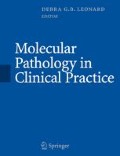Abstract
Familial adenomatous polyposis (FAP) is an autosomal dominantly inherited disorder that predisposes affected individuals to colon cancer through the early development of hundreds to thousands of adenomatous polyps (Figure 18-1). Florid polyposis throughout the colon will develop in 50% of affected individuals by age 16, and 95% will have polyposis by age 35.1 If left untreated, colorectal cancer is inevitable in those with FAP, with an average age at diagnosis of 39 years. The incidence of FAP is estimated to be 1 in 8,300 to 1 in 14,025 live births and represents less than 1% of all colon cancers.1 FAP is clinically diagnosed when an individual has greater than 100 colorectal adenomatous polyps.
Access this chapter
Tax calculation will be finalised at checkout
Purchases are for personal use only
Preview
Unable to display preview. Download preview PDF.
References
American Gastroenterological Association. AGA technical review on hereditary colorectal cancer and genetic testing. Gastroenterology. 2001;121:198–213.
Soravia C, Berk T, Madlensky L, et al. Genotype-phenotype correlations in attenuated adenomatous polyposis coli. Am J Hum Genet. 1998;62:1290–1301.
Lynch HT, Smyrk TC, Watson P, et al. Hereditary flat adenoma syndrome: a variant of familial adenomatous polyposis? Dis Colon Rectum. 1992;35:411–421.
Spirio L, Olschwang S, Groden J, et al. Alleles of the APC gene: an attenuated form of familial polyposis. Cell. 1993;75:951–957.
Kinzler KW, Vogelstein B. Colorectal tumors. In: Vogelstein B, Kinzler KW, eds. The Genetic Basis of Human Cancer. New York: McGraw-Hill; 2002:583–612.
Truta B, Allen BA, Conrad PG, et al. A comparison of the phenotype and genotype in adenomatous polyposis patients with and without a family history. Fam Cancer. 2005;4:127–133.
Moisio A-L, Jarvinen H, Peltomaki P. Genetic and clinical characterisation of familial adenomatous polyposis: a population based study. Gut. 2002;50:845–850.
Friedl W, Caspari R, Sengteller M, et al. Can APC mutation analysis contribute to therapeutic decisions in familial adenomatous polyposis? Experience from 680 FAP families. Gut. 2001;48:515–521.
Heppner Goss K, Trzepacz C, Tuohy TM, Groden J. Attenuated APC alleles produce functional protein from internal translation initiation. Proc Natl Acad Sci USA. 2002;99:8161–8166.
Sieber OM, Lipton L, Crabtree M, et al. Multiple colorectal adenomas, classic adenomatous polyposis, and germ-line mutations in MYH. N Engl J Med. 2003;348:791–799.
Hedge MR, Chong B, Blazo ME, et al. A homozygous mutation in MSH6 causes Turcot syndrome. Clin Cancer Res. 2005;11:4689–4693.
Hamilton SR, Liu B, Parsons RE, et al. The molecular basis of Turcot’s syndrome. N Engl J Med. 1995;332:839–847.
Wallis YL, Morton DG, McKeown CM, Macdonald F. Molecular analysis of the APC gene in 205 families: extended genotype-phenotype correlation in FAP and evidence of the role of APC amino acid changes in colorectal cancer predisposition. J Med Genet. 1999;36:14–20.
Leung SY, Yuen ST, Chan TL, et al. Chromosomal instability and p53 inactivation are required for genesis of glioblastoma but not for colorectal cancer in patients with germline mismatch repair gene mutation. Oncogene. 2000;19:4079–4083.
Miyaki M, Iijima T, Shiba K, et al. Alterations of repeated sequences in 5′ upstream and coding regions in colorectal tumors from patients with hereditary nonpolyposis colorectal cancer and Turcot syndrome. Oncogene. 2001;20:5215–5218.
Boardman LA. Heritable colorectal cancer syndromes: recognition and preventive management. Gastroenterol Clin North Am. 2002;31:1107–1131.
Aaltonen L. Peutz-Jeghers syndrome. In: Vogelstein B, Kinzler KW, eds. The Genetic Basis of Human Cancer. New York: McGraw-Hill; 2002:337–341.
Hampel H, Peltomaki P. Hereditary colorectal cancer: risk assessment and management. Clin Genet. 2000;58:89–97.
Giardiello FM, Brensinger JD, Tersmette AC, et al. Very high risk of cancer in familial Peutz-Jeghers syndrome. Gastroenterology. 2000;119:1447–1453.
Ylikorkala A, Avizienyte E, Tomlinson IP, et al. Mutations and impaired function of LKB1 in familial and non-familial Peutz-Jeghers syndrome and a sporadic testicular cancer. Hum Mol Genet. 1999;8:45–51.
Karuman P, Gozani O, Odze RD, et al. The Peutz-Jegher gene product LKB1 is a mediator of p53-dependent cell death. Mol Cell. 2001;7:1307–1319.
Mehenni H, Lin-Marq N, Buchet-Poyau K, et al. LKB1 interacts with and phosphorylates PTEN: a functional link between two proteins involved in cancer predisposing syndromes. Hum Mol Genet. 2005;14:2209–2219.
Forcet C, Etienne-Manneville S, Gaude H, et al. Functional analysis of Peutz-Jeghers mutations reveals that the LKB1 C-terminal region exerts a crucial role in regulating both the AMPK pathway and the cell polarity. Hum Mol Genet. 2005;14:1283–1292.
Gruber SB, Entius MM, Petersen GM, et al. Pathogenesis of adenocarcinoma in Peutz-Jeghers syndrome. Cancer Res. 1998;58:5267–5270.
Author information
Authors and Affiliations
Editor information
Editors and Affiliations
Rights and permissions
Copyright information
© 2007 Springer Science+Business Media, LLC
About this chapter
Cite this chapter
Neibergs, H.L., Massey, A.T. (2007). Familial Adenomatous Polyposis and Turcot and Peutz-Jeghers Syndromes. In: Leonard, D.G.B., Bagg, A., Caliendo, A.M., Kaul, K.L., Van Deerlin, V.M. (eds) Molecular Pathology in Clinical Practice. Springer, New York, NY. https://doi.org/10.1007/978-0-387-33227-7_18
Download citation
DOI: https://doi.org/10.1007/978-0-387-33227-7_18
Publisher Name: Springer, New York, NY
Print ISBN: 978-0-387-33226-0
Online ISBN: 978-0-387-33227-7
eBook Packages: MedicineMedicine (R0)

